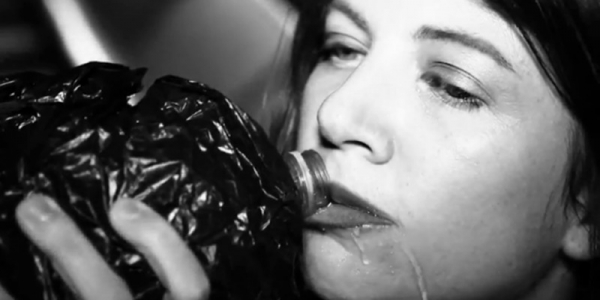“Our albums capture a moment of time, how we are navigating ourselves through life…how any human is (navigating oneself)” says Standish; the warm tone of her voice articulates this point with a thoughtful resonance. Communicating this, she continues, “It is one of the things I like most about playing in a band.” Each of HTRK’s albums have strong thematic elements, as a listener the appeal of the music can at times verge on the voyeuristic; from Marry Me Tonight’s lustful diary entry lyrics to Work (work, work)’s subtle throb of the physical; we are but spectators of a private world.
Examining moments in time and climate, HTRK’s compositions have particular points of reference in place. “We write for a certain temperature or a time of day,” says Standish. “Work was an early morning album, in bed with friends, but this album is for driving around at 3am; we (always) have a specific time frame that we write to.” Temperature also features prominently, with Yang noting musician John Hassell’s concept of fourth world music as inspiration. “It sounds kind of weird,” says Yang, “but moving to Sydney after London – summer is incredibly humid, it’s interesting to write in a different environment.” Hassell’s ideas about the western/rational style of composition (minimalism) and that of the more emotional Asian and African styles generating a new “fourth world” of music, relies heavily on the use of electronic instruments. In Australia, there’s a synergy of cultural and temporal opposites: “we have a unique mix, a mix of these two elements,” explains Yang. “It took getting back to draw attention to that.”
Although thematically influenced by Australia’s temporal conditions, HTRK’s fourth album was initially recorded in Santa Fe, New Mexico, with Nathan Corbin of Excepter. On meeting Corbin, Standish reflects, “We connected, the three of us – we were all going through something, experiencing great loss; (HTRK’s Sean Stewart tragically passed in 2010) we connected through those levels and liked each other’s music”. Recording seemed a natural extension of this friendship, with HTRK following Corbin into his Santa Fe studio to begin work on a free form session that would yield half an album of songs. The band then finished these recordings in New York. “I think he’s really good at electronic stuff,” Yang says of Corbin. “He’s got a lot of really good analog gear.” Corbin’s collection includes a huge Oberheim matrix synth – which Yang describes as “hard to control but makes a great short, in- your- face sound” – in addition to other analog Moog synths, classic Roland Junos and a 909-drum machine. The three friends also bonded over a shared love of basic channel dub, reggae and dancehall.
For HTRK, their introduction to dub came from living in London and witnessing the West Indian/Caribbean culture of the city. “There’s a different energy and approach to life in London,” says Standish. For HTRK, the dub they were hearing from the locals was just one of many sub cultural influences on the band. The underground anarchist scene was another. “There’s an interesting scene in London” says Yang. “Going to bars where there would be parties to raise money for obscure anarchist causes; just completely weird, off the radar things. The parties would bring hundreds or thousands of people with no inhibitions, in these squats; it was completely anti-establishment. There was a guy who was a big fan of ours; he used to use our early records as the soundtracks for suspension hangings, bloodletting and other S&M (activities) – those guys are a scene unto themselves, to have a glimpse into that world was really intriguing and inspiring to us”.
Whilst HTRK were living in London, Paul Smith (of Blast First Petite) began to manage the band. Coincidentally, Smith was also manager of Cosey Fanni Tutti, founding member of seminal industrial act Throbbing Gristle and one half of Chris & Cosey. Standish greatly admired Cosey, and this fortuitous set of circumstances has led to the two to develop a relationship, with Cosey taking on the role of positive mentor for Standish. Of this relationship, Standish says, “More musicians should seek out mentors – just ask questions, they have so much to offer, so to be able to get advice from these people about how to age through music and still be inspiring is really important. Just grab on and learn! With musicians, all these secrets are kept so private – we should be more open.”
The sense of sincerity underlying HTRK’s music is what sets the band apart from their contemporaries. Working on their new album as a duo, Standish states, “ With this album the lyrics have come easy and they are my best lyrics yet; there’s strong elements to do with dissecting the value of love, the distraction of love and perhaps, subconsciously, from a female perspective – surpassing love.” Inimitable as always, HTRK occupy an important space within Australian music, thematically challenging the listener and ever evolving into new spheres of aural magnetism.
BY CASSANDRA KIELY

